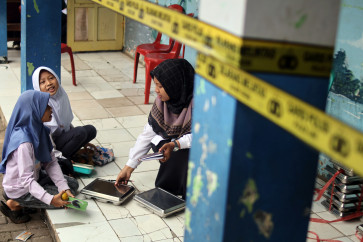Popular Reads
Top Results
Can't find what you're looking for?
View all search resultsPopular Reads
Top Results
Can't find what you're looking for?
View all search results‘Upeti’ corruption remains rampant across country
The term upeti derives from Indonesia’s pre-colonial era and refers to tribute in the form of wealth paid by a kingdom’s executives to the king
Change text size
Gift Premium Articles
to Anyone
T
he term upeti derives from Indonesia’s pre-colonial era and refers to tribute in the form of wealth paid by a kingdom’s executives to the king. As a result, the executives oppress the people and force them to submit a certain sum of money or proportion of their harvest to fulfill the king’s demands.
The practice of upeti continued into the colonial era and even evolved into one of the most common forms of corruption.
Today, upeti refers to an illicit submission of money in a bid to win favor with the recipient, who is an individual with powerful authority. According to the 2001 Corruption Law, such a submission counts as a gratuity, or even bribery.
Hadi Prasetyo, a former assistant to the East Java provincial secretary, admitted such practices were still common.
“Not only in East Java, but all across Indonesia. Where there is money and people [with power], the prospect of upeti practices will always be there,” he said in Surabaya, East Java, on Sunday.
He was commenting on the recent arrests of six people, including East Java Provincial Legislative Council member Mochamad Basuki, by the Corruption Eradication Commission (KPK). Basuki was arrested as he allegedly accepted Rp 150 million (US$11,300) in upeti from the province’s agriculture agency head Bambang Heryanto, who was also arrested.
According to the KPK, Bambang was allegedly committed to paying upeti quarterly to Basuki amounting to a total of Rp 600 million per year.
Hadi said the case could have been related to the councillors’ budgetary power, which was often “abused to intimidate” provincial administration officials
“We were often ‘bullied’ so that some of us might give up and succumb to the request [for upeti],” Hadi.
In Medan, North Sumatra, a member of the province’s legislative council, Sutrisno Pangaribuan, acknowledged such a practice was still alive, saying it was an “open secret.”
“Councillors may want to set 5 percent of a project value as upeti for them,” the Indonesian Democratic Party of Struggle (PDI-P) politician told The Jakarta Post, last week.
He claimed he had been offered upeti but rejected it and threatened to report it to the KPK.
Yudi Kurnain, a member of the Batam City Legislative Council in Riau Islands, echoed Sutrisno, saying the practice was difficult to eradicate as it had existed for years.
Speaking in Jakarta, State Civil Bureaucracy Commission (KASN) chairman Sofian Effendi said poor transparency had contributed to making the legislative-executive relationship a hotbed of upeti practices.
He said officials and legislative members should never discuss budgeting matters other than in official meetings that were open to public.
“The system should be transparent. [Officials and politicians] should not be allowed to have face-to-face discussions that allow them the opportunity to make illegal transactions,” he told the Post.
Home Ministry regional autonomy director general Sumarsono concurred, suggesting that officials were often tempted to give gratuities in order to accelerate the budgeting process.
“The schedule for budgeting is very tight, while legislative members need funds for their political costs. This is where [upeti] usually ends up in the negotiations,” said the former acting Jakarta governor.
Anti-corruption activists said regular upeti submissions as alleged in the Surabaya case were also common, hence some officials or businessmen were called “walking ATMs.”
Indonesia Corruption Watch (ICW) researcher Febri Hendri said transparent systems such as e-government, e-asset, e-planning, e-budgeting, e-procurement and e-purchasing would be effective in curbing corruption.
“If the public can access such documents, they [officials] will be afraid to engage in corruption,” he told the Post. (ecn)
Fadli and Suherdjoko contributed to the story from Batam, Riau Islands; and Semarang.










